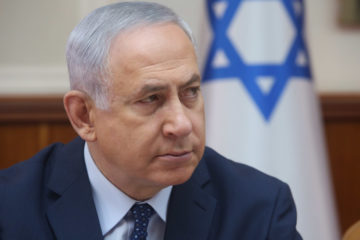Netanyahu Peace Talks Overture to EU Spurs Criticism, Skepticism

©2015 Bloomberg News
NOYE0L6JTSE8
(Bloomberg) — Israeli Prime Minister Benjamin Netanyahu has proposed restarting peace talks with the Palestinians by defining the borders of West Bank territory Israel would keep in a final deal.
Palestinians dismissed the offer, presented by Netanyahu as an attempt to eliminate future disputes over settlement construction, as a thinly veiled annexation plan. The apparent overture toward peacemaking also conflicts with steps he’s taken since forming his new government that suggest a harder line on peacemaking.
Netanyahu raised the idea in a meeting with European Union foreign policy chief Federica Mogherini in Jerusalem on May 20, the Haaretz daily reported. Demarcating the contours of Jewish settlement blocs his country would retain in a final deal with the Palestinians would allow Israel to continue building in those areas without facing international condemnation and possible economic and diplomatic sanctions.
The offer comes at a time when Israel’s international standing is suffering. Relations between Israel and the U.S. are especially strained by conflicting views over stalled peacemaking with the Palestinians and Iran’s nuclear program. In Europe, support for the Palestinian statehood campaign has gained momentum, and there are efforts to impose sanctions on goods produced in Jewish settlements. The Palestinians, meanwhile, have embarked on a diplomatic campaign to isolate Israel and have taken steps to prepare to prosecute it at the International Criminal Court, a war crimes tribunal.
Same Policy
The proposal didn’t represent a change in Israeli policy, according to an official in Netanyahu’s office, who wasn’t authorized to speak on record. After meeting the EU envoy, Netanyahu reiterated his commitment to a two-state solution with the Palestinians, distancing himself again from comments he made before his March 17 re-election that suggested he no longer thought that was possible.
The Palestinians have a demanded a building freeze in all areas Israel captured in the 1967 Middle East war as a condition for resuming negotiations that broke down last year. Chief Palestinian negotiator Saeb Erekat called Netanyahu’s proposal “a request to continue illegal settlement construction with Palestinian consent.”
“This looks like one state and two systems rather than two sovereign and democratic states,” Erekat said in an e-mailed statement.
1967 Lines
Nabil Abu Rudeina, a spokesman for Palestinian President Mahmoud Abbas, said the basis of negotiations must be the recognition of Israel’s prewar 1967 borders, with Jerusalem as the capital of an independent Palestinian state. “Final status issues cannot be separated or postponed,” he said.
Former Israeli foreign minister and chief negotiator Tzipi Livni, now a lawmaker in the opposition Zionist Union party, said Netanyahu’s strategy would endanger Israel.
“To define the borders of the state of Israel, and thus of a Palestinian state, without first making security arrangements, would be a blow to our security,” Livni told Army Radio.
Netanyahu’s renewed declaration of support for a two-state solution collides with recent appointments he’s made. While retaining the foreign minister’s post for himself, he chose as deputy foreign minister Tzipi Hotovely, a lawmaker from his Likud party who rejects the principle of Palestinian statehood and demands construction in all settlements. He appointed as ministry director-general a former Israeli ambassador to the United Nations, Dore Gold, who has been skeptical of reaching a peace deal with the Palestinians.
“There’s international diplomacy and there’s domestic politics, and Netanyahu’s suggestion to the EU seems like an attempt to bridge the gap between the two over the peace process,” said Shmuel Sandler, political science professor at Bar Ilan University outside Tel Aviv. “But I don’t see this idea being accepted by the Palestinians, nor by elements in his own government.”
–With assistance from Fadwa Hodali in Ramallah and Udi Segal in Jerusalem.
To contact the reporter on this story: Calev Ben-David in Jerusalem at cbendavid@bloomberg.net To contact the editors responsible for this story: Alaa Shahine at asalha@bloomberg.net Amy Teibel, Mark Williams






No Comment